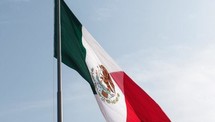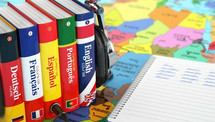Most Popular Languages Spoken in Brazil: Explore Their Diversity
Brazil: Country Overview
Brazil is located in South America. It is the biggest state on the continent, as well as in Latin America writ large. It ranks fifth in the world in terms of land area and population. Portuguese is the official language spoken in Brazil. Brasilia is the capital city of the country.
This country is a federal republic with a presidential system of government. The current president is Jair Bolsonaro, who took office in January 2019. Brazil has a multi-party system, with political parties ranging from center-left to far-right.
It has over 213 million people and is home to diverse ethnicities and cultures. The country is known for its natural beauty, including the Amazon rainforest, the Pantanal wetlands, and the beaches of Rio de Janeiro.
The country's diverse economy includes agriculture, industry, and services. It is the world's leading coffee, sugarcane, oranges, soybeans, corn, and beef producer. It is also home to many large multinational corporations, including Petrobras, Vale, and Embraer.
The country is known for its vibrant culture, including music, dance, and festivals. Samba and bossa nova are two popular forms of Brazilian music, and Carnival in Rio de Janeiro is one of the world's largest and most famous festivals.
There are many languages spoken in Brazil, but the most broadly spoken one is Portuguese. It is the country’s official language. In addition to Portuguese, several indigenous dialects, such as Guarani, Kaingang, and Yanomami, are spoken.
There are also immigrant languages, such as German, Italian, Japanese, and Spanish, spoken by smaller populations. The country is considered linguistically diverse, with over 200 dialects spoken across its territory. In case you wonder what is the official language of Brazil, you guess it right - it is Portuguese. If you need professional Brazilian Portuguese translation services to translate your documents or any other content, make sure you hire qualified translators due to your due diligence by going through expert reviews and identifying a service that meets your needs best.
Despite its many strengths, Brazil faces a number of challenges, including income inequality, poverty, and crime. The country also faces environmental challenges, including deforestation and climate change.
Historical Snapshot
Brazil is an emerging and powerful economy that has come a long way to claim its spot under the sun in the world. It is definitely the most important power in South America. It ranks fifth globally by both land area and population. The country has a rich and diverse history that envelops thousands of years.
Indigenous peoples had inhabited the territories of the modern-day country for many centuries prior to the arrival of European explorers and conquerors in the late 15th century. The first known European to arrive was Pedro Álvares Cabral. Most likely, he was the first European to hear the Brazil native language spoken in those days. Cabral went on to claim the land for Portugal in 1500. Later, Portuguese explorers established settlements along the coast, and the country became a center for the Portuguese empire's trade in gold, diamonds, and sugar.
In the early 19th century, Brazil declared independence from Portugal and became a constitutional monarchy. Subsequently, the country's economy started to grow rapidly by the end of the 19th and at the dawn of the 20th century, fueled by coffee exports and numerous waves of European immigration.
In 1930, a military coup brought Getulio Vargas to power. He served as president, with brief interruptions, until 1945. During his rule, Vargas implemented reforms to modernize the country and strengthen its economy. He also established a dictatorship that lasted until 1945. Brazil continued to be a country of controversy, poverty, and political strife. The people had to live under authoritarian regimes for a couple of decades in the late sixties, seventies, and early eighties of the 20th century.
Brazil returned to democracy in 1985, following two decades of military rule. Since then, the country has experienced significant economic growth, becoming one of the world's largest economies. However, this country continues to face poverty, inequality, corruption, and crime challenges.
It is a vibrant and diverse country with a rich cultural heritage, including music, dance, cuisine, and linguistic diversity. If you wonder what language do they speak in Brazil, it is Portuguese. Since Portuguese is very close to Spanish, Brazilians find it easy to interact with the neighboring countries where people predominantly speak Spanish. Those who still need online Spanish translation services to translate documents or other content into Portuguese are meticulous about choosing a reliable service provider that can ensure top quality and accuracy of the translation.
Brazil is also home to a wide range of natural wonders, including the Amazon rainforest. It has become a member state of BRICS, an informal group of emerging economies, including India, China, and South Africa.
Official Language of Brazil and Minor Ones
Portuguese is recognized as the country’s official language. It is mandatory to use it by civil servants and the authorities to deal with official documents, government proceedings, and education. Portuguese was introduced to Brazil during the Portuguese colonial period and has since become an integral part of Brazilian culture and society.
In addition to Portuguese, what language does Brazilian speak in different parts and regions of the country? There are many other languages spoken in Brazil, including indigenous ones and regional dialects of Portuguese. In Brazilian society, different groups also speak Spanish, German, Italian, English, and African.
Portuguese Brazil Language vs. Portuguese in Portugal
Portuguese spoken in Brazil and Portugal are similar in many ways, and the two countries' peoples can certainly understand each other well enough. Still, there are some notable differences between the Brazilian language and the Portuguese of Portugal. These differences might sometimes inhibit understanding. Let’s review some of the main discrepancies between the two versions of Portuguese.
Grammar
The grammar of Brazilian Portuguese is generally simpler than that of European Portuguese. For example, Brazilian Portuguese uses the preterite tense more often than the imperfect tense, while it is the other way around in Portugal. Brazilian Portuguese also tends to use the present continuous tense more often than European Portuguese.
Spelling
There are different ways of spelling words in Brazilian and European Portuguese. For instance, Brazilian Portuguese would use the letters "k," "w," and "y" more frequently than European Portuguese.
Vocabulary
Portuguese, as the language of Brazil, has borrowed many words from the languages of indigenous populations and some African ones, as well as from English. In addition, some words take different meanings depending on where you use them, i.e., in Brazil and Portugal. To give you an example, the word "bicha" in Brazil means "line" or "queue," while in Portugal, it is a derogatory term for a gay man.
Pronunciation
One of the key differences is in the pronunciation of certain sounds. For instance, the letter "s" is often pronounced like "sh" or "zh" in Brazil. In Portugal, you will hear it pronounced as "s" or "ss." There are also differences in the pronunciation of vowels and diphthongs.
Intonation
The intonation patterns of Brazilian and European Portuguese are also different. Portuguese spoken in Brazil tends to have a more musical intonation, with a rising and falling pitch, while the European variant of Portuguese is generally more monotone.
Challenges
While the two variants of the language are mutually intelligible, there is a notable difference between Brazilian Portuguese and Portugal Portuguese that can sometimes make communication challenging.
Some More Minor Languages in Brazil
Portuguese is Brazil official language. It beats all others as the most widespread language in Brazil. It is native to nearly the entire population. Nevertheless, many others are still in use in minority communities of the country. Many need certified translation services to translate important documents, academic pieces, or other content from or into Portuguese. For that reason, they hire qualified translation companies with a solid reputation in the translation industry.
Some of the most common languages in Brazil are as follows:
Spanish
Many people wonder what language is spoken in Brazil, most after Portuguese. Due to Spanish-speaking countries in South America, many Brazilians speak Spanish as their second language.
German
Some communities speak German in the southern states of Santa Catarina, and Rio Grande do Sul, particularly in rural areas. If you need to translate from or into German, make sure you find and hire reliable and trustworthy German translation services. Read fact-based reviews and pick one with a proven track record in providing impeccable services.
Italian
Some communities speak Italian in the southern states of São Paulo, and Rio Grande do Sul. People here live in such closely-knit communities that they sometimes wonder what language do Brazilians speak in other regions of the country.
English
English is also widely spoken, particularly in urban areas and among the business community. It is also preferred for entrepreneurs and students going abroad. As the international lingua franca, English is indispensable for most of them.
African languages
Many Afro-Brazilian communities also speak African dialects, particularly Yoruba and Bantu, as a result of the country's history of slavery.
Indigenous languages
Which ones are some of the other Brazil languages? Brazil has a fairly impressive number of indigenous languages, many of which are in danger of becoming extinct because of the loss of traditional cultures and the dominance of Portuguese.
Few Words About Indigenous Languages
Brazil is home to many Indigenous languages, with approximately 200 spoken by groups nationwide. With such impressive linguistic diversity, it is not surprising that many people often look for the best online translation services to get some of their documents, data, or content translated between different tongues. Naturally, they pick those already proven themselves as reliable and trustworthy services on the market.
Some of the most widespread indigenous tongues include:
Tupi-Guarani
It ranks among Brazil's most widespread indigenous language families, spoken by various Indigenous groups across the country. It is not the main language in Brazil, but it is pretty common there.
Yanomami
Yanomami is spoken by the Yanomami people living in the Amazon region. Approximately 35,000 people speak it in about 250 villages.
Kaingang
The Kaingang people speak Kaingang in the southern part. The Kaingang population slightly exceeds 30,000.
Terena
Terena is also a native language of Brazil spoken by the Terena people in Mato Grosso do Sul. Up to 20,000 people speak Terena to this day.
Guarani
It is spoken by the Guarani people, who live in various parts of Paraguay, Argentina, and Bolivia. In Brazil, around 16,000 can speak Guarani.
Krahô
This language is spoken by the Krahô people who live in the central part of Brazil. Only around 3,300 people speak it today.
Xavante
This is an indigenous language spoken by approximately 30,000 Xavante people in central Brazil.
Pataxó
Up to 12,000 Pataxó people speak Pataxó in Bahia.
Key Takeaways About the Brazilian Language
Portuguese has been and remains both the official and the most broadly spoken in Brazil. The Brazilian Portuguese language slightly differs from the Portuguese version spoken in Portugal. With the growth of Brazil's economic and political clout, Portuguese is also becoming increasingly popular in the region. But it is not the single language spoken in the country. In addition to Spanish, German, Italian, English, and some African languages, Brazil has retained some indigenous languages.























